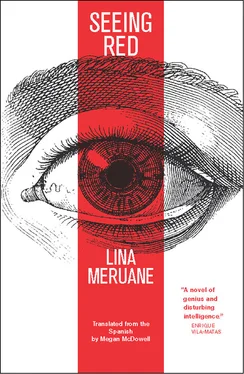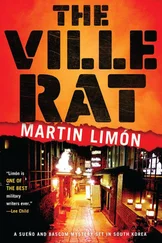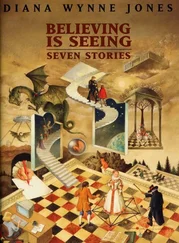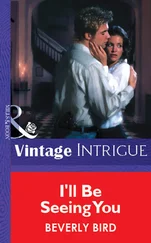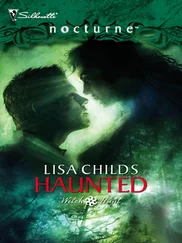Lina Meruane - Seeing Red
Здесь есть возможность читать онлайн «Lina Meruane - Seeing Red» весь текст электронной книги совершенно бесплатно (целиком полную версию без сокращений). В некоторых случаях можно слушать аудио, скачать через торрент в формате fb2 и присутствует краткое содержание. Год выпуска: 2016, Издательство: Deep Vellum Publishing, Жанр: Современная проза, на английском языке. Описание произведения, (предисловие) а так же отзывы посетителей доступны на портале библиотеки ЛибКат.
- Название:Seeing Red
- Автор:
- Издательство:Deep Vellum Publishing
- Жанр:
- Год:2016
- ISBN:нет данных
- Рейтинг книги:3 / 5. Голосов: 1
-
Избранное:Добавить в избранное
- Отзывы:
-
Ваша оценка:
- 60
- 1
- 2
- 3
- 4
- 5
Seeing Red: краткое содержание, описание и аннотация
Предлагаем к чтению аннотацию, описание, краткое содержание или предисловие (зависит от того, что написал сам автор книги «Seeing Red»). Если вы не нашли необходимую информацию о книге — напишите в комментариях, мы постараемся отыскать её.
This powerful, profound autobiographical novel describes a young Chilean writer recently relocated to New York for doctoral work who suffers a stroke, leaving her blind and increasingly dependent on those closest to her. Fiction and autobiography intertwine in an intense, visceral, and caustic novel about the relation between the body, illness, science, and human relationships.
Lina Meruane
Seeing Red — читать онлайн бесплатно полную книгу (весь текст) целиком
Ниже представлен текст книги, разбитый по страницам. Система сохранения места последней прочитанной страницы, позволяет с удобством читать онлайн бесплатно книгу «Seeing Red», без необходимости каждый раз заново искать на чём Вы остановились. Поставьте закладку, и сможете в любой момент перейти на страницу, на которой закончили чтение.
Интервал:
Закладка:
house of hard knocks
Thwacks against half-closed doors, all of their edges blunt. A nose mashed against a shelf. Scratched fingers, broken nails, twisted ankles almost sprained. Ignacio took note of every mishap and tried to clear the boxes still only half-emptied, he moved the open bags from the hallway and cleared away orphan shoes, but then I got tangled up in rugs, I knocked over posters leaning against walls, I toppled trash cans. I was buried in open boxes with table legs between my fingers. The house was alive, it wielded its doorknobs and sharpened its fixtures while I still clung to corners that were no longer where they belonged. It changed shape, the house, the rooms castled, the furniture swapped places to confuse me. With one eye blind with blood and the other clouded over at my every movement, I was lost, a blindfolded chicken, dizzy and witless. But I dried some sheepish tears and counted my steps again, memorizing: five long steps to the living room and eight short ones back to the bedroom, kitchen to the left, ten to the bathroom, to the left. The windows must be somewhere and I bumped right into Ignacio. You’re dangerous, he told me, angry, trying not to yell at me; stop wandering around, we’ll end up breaking all our bones. I know he stood there looking at me because I felt his eyes on mine, like snails coating me in their slime. Lina, he sighed, immersed in a sudden sadness or shyness. Lina, now even softer, holding my chin, his slimy eyes everywhere: you’re blind, you’re blind and dangerous. Yes, I replied, slowly. Yes, but I’m only an apprentice blind woman and I have very little ambition in the trade, and yes, almost blind and dangerous. But I’m not going to just sit in a chair and wait for it to pass. Ignacio would have preferred me to sit and meditate, but there’s nothing to think about now, I told him, snatching his cigarette by touch and taking a forbidden drag. I’ve already thought everything thinkable, I said, taking an even deeper drag. Thinking, I repeated, moving the butt out of reach when Ignacio tried to take it from my fingers — I accidentally hit the light bulb — I’ve been thinking since the first time I went, against my will, into an eye doctor’s waiting room. Since then I’ve done nothing but think about the future, and how I’ll never see it. Think about that twisted and recalcitrant doctor saying I was carrying a time bomb inside me, ticking faster and faster. He reported all the medical details to my mother, I went on, as if I wasn’t sitting right there next to her and getting splashed by all the sticky, acidic saliva he was spouting. The doctor never looked at me, but the thick lenses of his eyeglasses are burned into my memory, and the clogged corneas crisscrossed with thin lines, those miserable, miniature eyes that from the doctor’s very depths had foreseen this moment. Then I remembered, now without telling Ignacio, the way the doctor adjusted his black frames atop his nose while he murmured that maybe — but only maybe because no one can be sure — that maybe in a few years the diseased organ could be replaced with another, compatible one. And I remembered having thought about what it would be like to see through foreign eyes. The doctor’s myopic eyes, I said aloud, raising my voice, his eyes made me more afraid than the future of my own, because they are eyes that have followed me and are still coming after me; even in dreams, Ignacio, those rabbit eyes. I don’t have anything left to think about, I repeated. Think about it yourself, if you want. Really think about it, I insisted, raising my black eyes toward Ignacio and feeling I was losing my balance. I said it like a challenge, like an accusation, like a reproach, because it wasn’t the first time I’d said this to him. I’d begun to say it six months before, starting with the dinner we gave Ignacio after his talk, the dinner I’d attended as a doctoral student, and where I’d sat down across from him to tell him I wrote, too. How I’d started in journalism but then they kicked me out for falsifying the objective truth of the facts, and I moved on to fiction, one hundred percent pure, I’d told him, caressing his leg with my calf. And to prove it I put my latest novel on the table, explaining that I’d condensed my name. So are you or aren’t you Lina Meruane? Sometimes I am, I said, when my eyes let me; lately, I’m less and less her and I go back to Lucina. The extra syllable bled sometimes. Ignacio’s face took on a puzzled expression and he chose not to believe my insinuation that I suffered from a defect that could leave me blind. Blind, I said, without dramatics, without losing my smile while we had a long drink while the distance between us got ever shorter. He should really think about it before he paid my bill and invited me into the taxi, I told him, before he touched me, gave me that wet kiss on the ear and then on the lips, before my sighs that were used but felt new, before my absolute silence, before he ever brought me a pancake breakfast in bed, or strummed that languid, cloying bolero on an old guitar, before he ever asked me to stay. To stay. First, yes, think about it. Think about it hard, I told him, looking at him fiercely, hoping he wouldn’t think for too long, obliging him to at least pretend to think. Ignacio, I thought, now without insisting; Ignacio, open your eyes, you still have time.
price is right
There beneath the hair, inside his skull, in all those brains, Ignacio resolves that we should go out. Go out immediately, at a run if possible. We’ve spent the whole morning stuck inside waiting for the secretary’s call, him wandering around the house, me very still, immersed in a nineteenth-century novel that an unknown reader whispers to me from the walkman. Ignacio shakes me. I press pause, stop. The secretary just informed him that I can’t have an appointment until Monday. What happened to Friday? No one canceled, no one is going to miss their appointment today, Ignacio says Yuku told him. Desperate and inconsolable, Ignacio announces that if we don’t go out we will die of suffocation. We should go out and do something: look for furniture at second hand stores, for example. I wouldn’t be able to choose anything by myself, you have to come, he insists, and I accept because never have I had more free time. Never as much as I do now, in the Manhattan streets full of deadly potholes and manholes with ladders that lead down to hell. The light hits my face but I can’t touch it, I can’t use it, and I walk through the city like I’m on a tightrope, leaning against Ignacio who walks at a different pace, syncopating his unmistakable steps with other, unfamiliar ones, sharp-heeled and rushed, that wound the pavement. We rummage among furniture made of smooth and wild wood that evoked exotic birds and mandrills, lichens, African songs; and there is also the scent of candied peanuts and caramel apples, of pretzels, bagels just out of the oven, grazing our noses. Nothing Ignacio sees convinces him, and I, who can’t see enough and who follow his description of the world with only my fingertips, am afraid I’ll fall over at any moment, struck down by heat and displeasure. Then we go into a new furniture store and we rest by trying out some armchairs under dry, conditioned air. Can I help you? says a voice equally cold and dry but more inclement, and I know Ignacio feels duty-bound to give explanations, improvising a British accent that comes out respectably well. He talks about how our house is bare, how we only have, for now, a mattress on the floor and a dozen unopened boxes and suitcases. And a couple of rugs, and a scratch on the floor, I correct him through clenched teeth, no talent for posturing. I suspect Ignacio is looking around, that on the inside he is furnishing the postcard from nowhere: coffee table, sofa, recliners, and chairs that would have to survive us like the children we’ll never have. While he describes what our house will be like, I organize all that furniture we can’t afford in an imaginary budget. And the light now is so tenuous. When the saleswoman turns around Ignacio decides in the blink of an eye that the purchase can wait for a better moment. And he drags me out to the scorching street and I still hear him saying, breathless, more light, we have to have enough light, that’s the most important thing, right? And yes, yes, sure, light, bulbs and lamps and screens, all that, I answer, breathless myself, already up to my neck with him in a store full of lamps. Lamps that are old but mended, like the store’s owners: a sixty-something couple with long-lived lamps their own hands have refurbished. The younger man goes up the stairs to bring a lamp down. Are we only going to buy one? They’re not cheap, answers Ignacio, and what do we want another one for? So we have enough light, I say. So we don’t have a one-eyed living room, I add. Always two, just in case. We argue. The older one straightens his neck and decides for Ignacio that yes, it’s always better to have two. Lo está diciendo porque tiene un ojo en blanco, Ignacio grumbles defensively in Spanish. A white eye? What happened to your eye? I ask, turning to the old man. I feel Ignacio squeezing my hand while he apologizes for me, explaining that I’m asking because I have a problem with my sight, too. A problem, I repeat, I’m practically blind. Ignacio lets go of my hand then and puts his own away in his pocket, along with his metro card. I wait. I had a stroke, the salesman says, a stroke right here in my eye, he adds. There was no way to revive it, he says. An eye isn’t a heart. It’s not even half a heart. It’s much less, I add, that’s why we have two. The old man stands there reflecting, but not about what I’d just said. His dead eye never really bothered him much, he explains sadly, though without really explaining himself. He clears his throat and says that his people were dying back then. In the eighties, I say, asking but really affirming, because suddenly I know what he’s going to tell me. I know that he is, in his way, a survivor. That many people like him were filled with ganglia, with inexplicable ulcers, and that some went crazy or blind before sinking into stigma. That stigma had brushed against me and left a splinter behind: someone, maybe a decade ago, had told me that their AIDS diagnosis had been the closest thing he knew to having diabetes. That someone had identified with me, and then that someone had started to die in the eyes. The last time I saw him, he was blind. Only he and I are left, said the voice of the old man next to me, succinct as a summary trial. He was a judge of just causes, talking to himself. Only he and I, he repeats. I’d like to know where the other old man is; I’d like to be able to turn around, look toward the back of the store, where the old finger is surely pointing and expecting my eyes to follow. Losing this eye was the price I paid, he says without regret: the small price of staying alive.
Читать дальшеИнтервал:
Закладка:
Похожие книги на «Seeing Red»
Представляем Вашему вниманию похожие книги на «Seeing Red» списком для выбора. Мы отобрали схожую по названию и смыслу литературу в надежде предоставить читателям больше вариантов отыскать новые, интересные, ещё непрочитанные произведения.
Обсуждение, отзывы о книге «Seeing Red» и просто собственные мнения читателей. Оставьте ваши комментарии, напишите, что Вы думаете о произведении, его смысле или главных героях. Укажите что конкретно понравилось, а что нет, и почему Вы так считаете.
